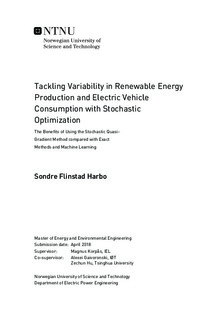Tackling Variability in Renewable Energy Production and Electric Vehicle Consumption with Stochastic Optimization - The Benefits of Using the Stochastic Quasi-Gradient Method compared with Exact Methods and Machine Learning
Master thesis
Permanent lenke
http://hdl.handle.net/11250/2507657Utgivelsesdato
2018Metadata
Vis full innførselSamlinger
- Institutt for elkraftteknikk [2503]
Sammendrag
The work presented in thesis investigates different applications for implementing the Stochastic- Quasi Gradient (SQG) model to solve stochastic multistage AC-OPF problems, and com- pares it with a Stochastic-Dynamic Programming (SDP) approach and an Evolutionary algorithm.Where the SDP quickly becomes too cumbersome to solve, the thesis also shows the other two as more appropriate tools, where the SQG method works better in larger cases, the Evolutionary algorithm in smaller.Hence, to analyze how energy storage may optimally be used for incorporating variable renewable energy sources to bigger grid networks, the SQG method may be of academic and practical interest.
